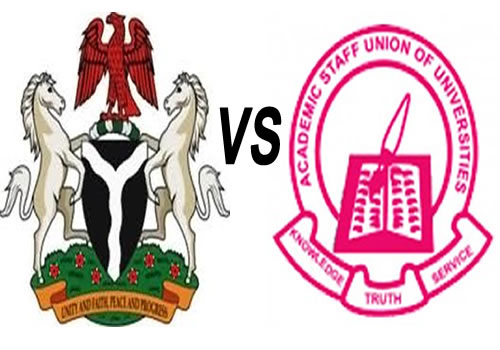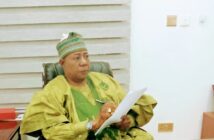By Mustapha Abubakar
The protracted industrial dispute between the government and the union of university lecturers can be described as a class dispute reflecting a conflict of interests.
To ASUU, the bone of contention has been the 2009 FG – ASUU agreement yet to be fully implemented by the government.
This is the concept of revitalization of the ivory towers to the tune of 1.3 trillion agreed upon in 2013 to be released over a period of six years.
This process is in line with the masterplan of protecting the interests of the university community as well as enhancement and upgrading of the university standard to an enviable level with a view to placing the system on academic pedestal of competitive advantage globally.
The government, on the other hand, as the owner of these universities, has reasons to protect the interests of all and sundry beyond education sector as it appears unreasonable to jump into conclusion that a landlord will make a deliberate move towards demolition of structures constructed with his hard-earned resources.
A peep, however, into historical record of industrial disputes in Nigeria reveals some pocket of industrial conflicts traceable to colonial era.
Notable among them include agitation of rail workers, 1938, for good working condition.
The year 1941 also witnessed the civil service and the Nigerian union of railway men demanding for a cost of living condition allowance while the 1945 general strike was due to the refusal of the colonial regime to honour its pledges to workers.
Strike actions became the order of the day till 1964 when another general strike by the United Labour Union took place, leading to demonstration in Lagos over non – implementation of the revised salary structure.
Military regimes were not an exception as various strike actions cum labour union struggles were experienced.
As a matter of fact, the Murtala/ Obasanjo regime, in 1978, banned Nigerian Labour Congress (NLC) and some labour leaders. Proscription of NLC,1988, during the regime of Gen. Babangida was not amazing to say the least. The embargo placed on Nigerian Union of Petroleum and National Gas workers NUNPENG and PENGASSAN by Abacha regime is still fresh in our memories.
Conflict is inevitable but a dysfunctional conflict is destructive. Conflicts should provide a medium for better understanding of the parties involved in the dispute and not otherwise.
The National Association of University Teachers (NAUT) came on board in 1965 advancing the interest of the lecturers until 1978 when it was succeeded by the Academic Staff Union of Universities (ASUU) which has been the vanguard of defence of interests of its members as well as other stake holders in the system till date.
Since the existence of NAUT till the time of its metamorphosis into ASUU, the union has been, on various occasions, ventilating its graviances via strike actions to drive home its points as noted in 1988 when it bore its fang against the government in order to obtain fair wages and University autonomy.
The year 1994/1996, however, did not pass away without the same experience of ASUU strike which lasted up to a year during the regime of late Sanni Abacha.
The year 1999 marked the dawn of a new era of democracy in which these fundamental issues in education sector should have been properly addressed in order to achieve the best in the sector.
Effects of ASUU strike has assumed both positive and negative dimensions. In terms of its positive effects, if the revitalization fund is adequately released, it will go a long way to facilitate and improve infrastructural developments covering adequate equipment of university libraries, massive construction of hostels, provision of internet facilities to enhance teaching and learning among others. Its negative impacts found expression in the disruptions of academic programmes as exemplified in the following years; 1999, 2001,2002, 2009,2010 and 2013 till date.
The strike has impacted negatively on the students subjecting them to abysmal level of immoral and criminal acts.
Nigerian Peace Corps, NPC, as a mega voice for peace building and conflict resolution hereby calls on the major actors which includes the government, lecturers as well as the National Association of Nigerian Students NANS, parents and guardians involved in the industrial dispute to embrace dialogue as an antidote against strike actions as well as the only panacea to facilitate peace settlement between the parties.
If truly the 2009 FG-ASUU agreement has been the major source of the lingering disputes, it has also become clear that incessant strike actions as highlighted above are incapable of resolving the conflict.
The agreement reached with the union requires an urgent review with a view to streamlining it with the present economic realities as we are not oblivious of the fact that government has narrowly, strategically pulled the country out of economic recession. This singular effort of the Buhari-led administration deserves accolades and general applaud.
Nigerian Peace Corps, therefore, advocates a collaborative effort – joint problem solving method to address the issue and to save our nascent democracy from collapse.
We appeal to every stakeholder to maintain and sustain the status quo of peace and tranquility in order to allow the government of the day to concentrate efforts on tackling the monstrous challenge of insecurity bedeviling the nation.
In conclusion, while NPC implores the government to accelerate the process of a critical reviewal of the 2009 agreement with the union and categorising it into three stages of immediate, medium and long term demands requiring an urgent attention, the Corps kicks against any act capable of creating crises, breakdown of law and order or any ignominious action that could tarnish the good image of the present administration.



